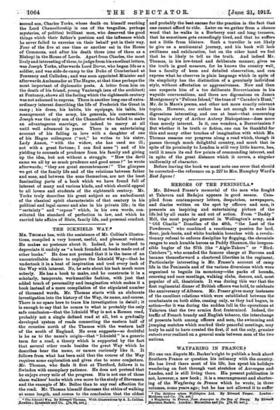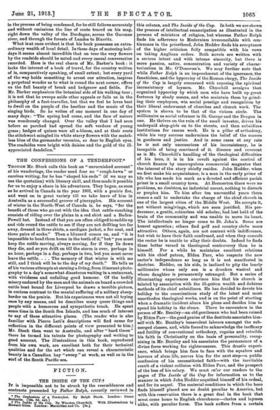WAYFARING IN FRANCE.f
No one can dispute Mr. Barker's right to publish a book about Southern France or question his intimacy with the country_ He has lived there most of his life, has spent his holidays- wandering on foot through vast stretches of Auvergne and, Landes, and is still living there. His present publication is- not, however, a new book ; it is a rearrangement and shorten- ing of the Wayfaring in France which he wrote, in three volumes, some years ago; but he has not allowed it to suffer
• The Soldiers whom Wellington Led, By Edward Fraser. London : Methuen and Co. [Ns. net.]
• The Icknield Way. By Edward Thomas. With illustrations by A. L. Collins. t Wayfaring in France, from Auvergne to the Bay of Biscay. By Edward'
in the process of being condensed, for he still follows accurately and without omissions the line of route traced on his map, right down the valley of the Dordogne, across the Garonne river, and through the forests of Landes to Biarritz.
What is at once evident is that his book possesses an extra- ordinary wealth of local detail. In these days of motoring holi- days it seems almost incredible that on tour the very flowers by the roadside should be noted and every casual conversation recorded. Here is the real charm of Mr. Barker's book : it lacks the interest of a book of travel, for the country written of is, comparatively speaking, of small extent; but every yard of the way holds something to arrest our attention, inspires a perpetual wonder as to what is round the next corner, offers us the full beauty of brook and hedgerow and fields. For Mr. Barker emphasizes the botanical side of his walking tour ; it is not that he sweeps aside other appeals or fails us in the philosophy of a foot-traveller, but that we feel he loves best to dwell on the purple of the heather and the music of the singing birds. So he writes of one moment in one day of many days : " The spring had come, and the face of nature was wondrously changed. Over the valley that I had seen before so parched had spread the soft verdure of young grass ; hedges of quince were all a-bloom, and at their roots the stitchwort mingled its white starry flowers with the match- less blue of the germander veronica, so dear to English eyes. The roadsides were bright with daisies and the gold of the ill- appreciated dandelion."











































 Previous page
Previous page